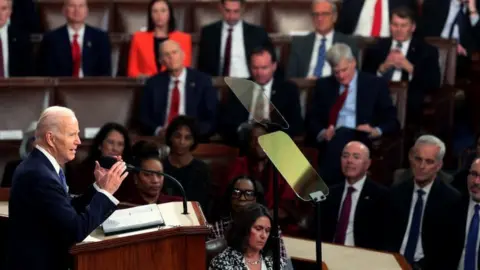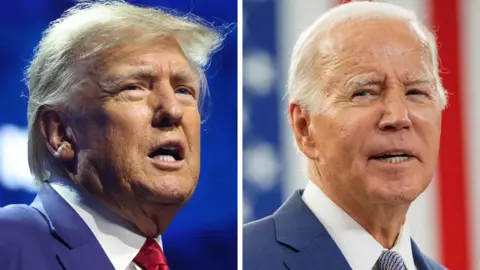State of the Union: Biden faces high-stakes address to calm Democratic nerves
 Getty Images
Getty ImagesPresident Joe Biden will deliver a high-stakes address to the American public on Thursday evening, as the 81-year-old seeks to tackle concerns about his age, put a positive gloss on his first-term record and lay out the case for his re-election in November.
The State of the Union address will give him a rare opportunity to speak to a national audience of millions, and draw a contrast with his Republican competitor, former President Donald Trump.
Traditionally these annual speeches to Congress are standard affairs, full of pageantry and laundry lists of legislative priorities. But this year, questions about Mr Biden's fitness for office and polls that suggest an extremely tight race for the presidency, mean the address is a critical moment for the president.
"This speech is particularly important to rally Democrats and calm their nerves," said Michael Waldman, who served as speechwriting director for President Bill Clinton. "He needs to show that he's vigorous and in command and a happy warrior."
Mr Biden's approval ratings are some of the lowest recorded for a president seeking re-election, and other surveys highlight the discomfort Americans across the political spectrum feel about giving him another four-years as the commander-in-chief.
Appearing to be a "happy warrior" while also fighting for your political life is not exactly an easy task - even when politicians are at the top of their game.
The eye test
Mr Biden has decades of experience delivering in high-stakes political moments, and he likely spent all weekend practising his speech's delivery.
But this turn on the national stage could prove crucial, as the president must appear competent and comfortable while speaking to Congress - and avoid any missteps that feed the damaging political narrative surrounding his seniority.
Questions about the president's age have been simmering for months, but they were supercharged by special counsel Robert Hur's investigation of Mr Biden's handling of classified documents.

More on the US election
- Explained: A simple guide to the US 2024 election
- Analysis: Where Biden v Trump will be won and lost
- Policies: What a Trump second term would look like
- Economy: Voters feel better - will that help Biden?
- Recap: The Trump life story to date

Within a searing 345-page report published last month, Mr Hur characterised the president as a "well meaning, elderly man with a poor memory" - a turn of phrase that has taken off among his critics.
The president - who has suffered from a stutter since boyhood - well knows that every cough, stammer and stumble will be put under the microscope, so he must be aware of how he looks and acts during Thursday night's address.
According to Robert Schlesinger, author of White House Ghosts: Presidents and Their Speechwriters, the president would benefit from landing a few notable moments that appear unscripted - sound bites that make him seem nimble and quick-witted, even if such moments are gamed out well in advance. This is something Mr Biden accomplished in last year's address.
"If he can get up there and seem feisty and not completely tied to his text, then it's an opportunity to convince the American people that the narrative about his age is not based in reality," he said.
A record to defend
By standard metrics, Mr Biden has a substantive record of legislative accomplishment in his first three years in office. Covid aid, gun-control legislation, infrastructure and technology investment and a raft of policies aimed at tackling climate change top the list.
Mr Biden's task is to remind voters of these programmes, and - perhaps most importantly - make it clear how these policies have benefited them.
Particularly key will be convincing Americans that the US economy is better off than most think, and that Mr Biden deserves credit for its marked improvements during his presidency.
While he can boast about low unemployment, a growing stock market and an expanding economy, he will have to account for the inflation that has ravaged American household finances. It remains a powerful criticism of his time in office, and fuels most voters' perception of the economy's health.
Another formidable challenge facing Mr Biden is the surge in undocumented migrants at the US-Mexico border, which has become an area of glaring weakness for his campaign.
The president is sure to point to the bipartisan immigration reform legislation that Republicans derailed, but it may not be enough to fully inoculate himself from Mr Trump's attacks and the belief of many voters that the White House has lost control of the border.
Mr Trump has once again made immigration a centrepiece of his campaign.
"Democrats can't really win the immigration issue, but they can try to fight to a draw," Mr Waldman said.
A contest of contrasts
A Biden campaign memo declared on Wednesday that the State of the Union address would present a "stark choice" the American people will have to make between Mr Biden's leadership and Mr Trump's "failed record and dark vision for this country".
Mr Biden is in a slightly different position than past presidents at the start of a re-election year. He knows exactly who his opponent in November will be, so he can craft his speech around Mr Trump, his predecessor's political weaknesses and presidential record.
 Getty Images / Reuters
Getty Images / ReutersEven if Mr Biden does not mention Mr Trump by name, he will seek to draw contrasts on areas of perceived strength, such as abortion rights, gun control and expanded healthcare - topics that put many Republicans on the opposite side of popular opinion.
His campaign has also hinted that "preserving democracy" will serve as a core theme of his address.
Mr Schlesinger says the president could weave a classic "Are you better now than you were four years ago?" theme throughout his speech, touching on the Covid pandemic and the national economic and social upheaval in the last year of the Trump administration.
A foreign policy morass
Issues of foreign policy are usually an afterthought in State of the Union addresses, and Mr Biden assured voters when he campaigned for president in 2020 that his foreign policy experience would bring stability to the world stage after a tumultuous Trump administration.
It hasn't turned out that way.
After a chaotic US withdrawal from Afghanistan that dented perceptions of Mr Biden's international competence, Russia invaded Ukraine and the 7 October attack on Israel by Hamas sparked a new war in Gaza - heightening regional instability.
Mr Biden enters this presidential campaign with a country split on providing Ukraine and Israel with US aid, and both conflicts are on the verge of spinning out of his control.
Republicans in the House of Representatives have blocked a vote for tens of billions of dollars in additional Ukraine military support for months now. Meanwhile, Mr Biden's Democratic coalition has been fractured by his vocal support for Israel and its military campaign.
To avoid these issues becoming a political liability over the coming months Mr Biden may use his speech to try to argue that he managed to take a bad global situation and kept it from getting much worse.


If you're in the UK, sign up here.
And if you're anywhere else, sign up here.

